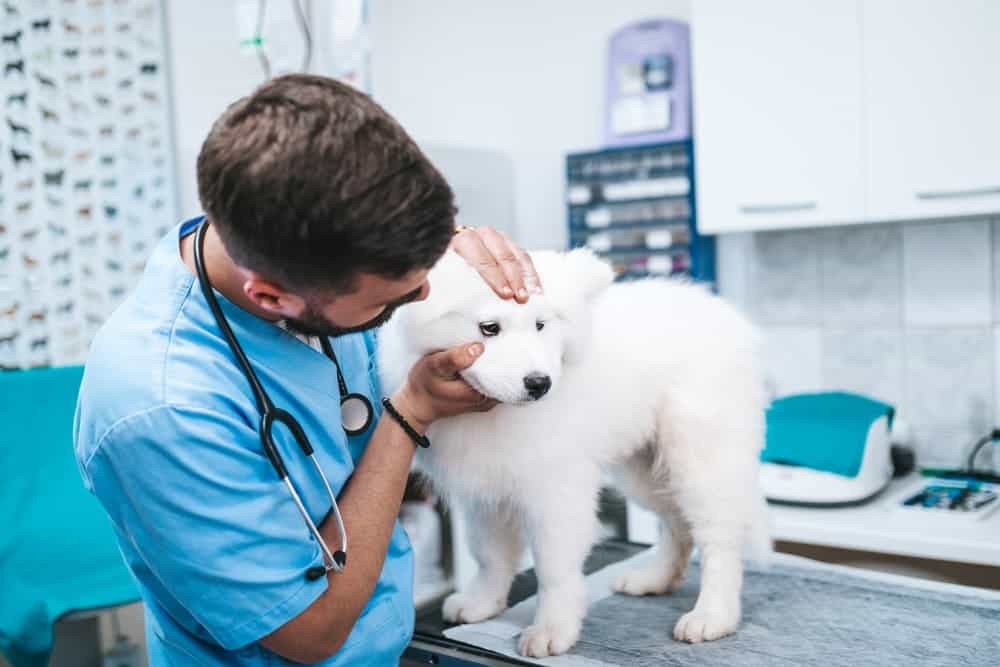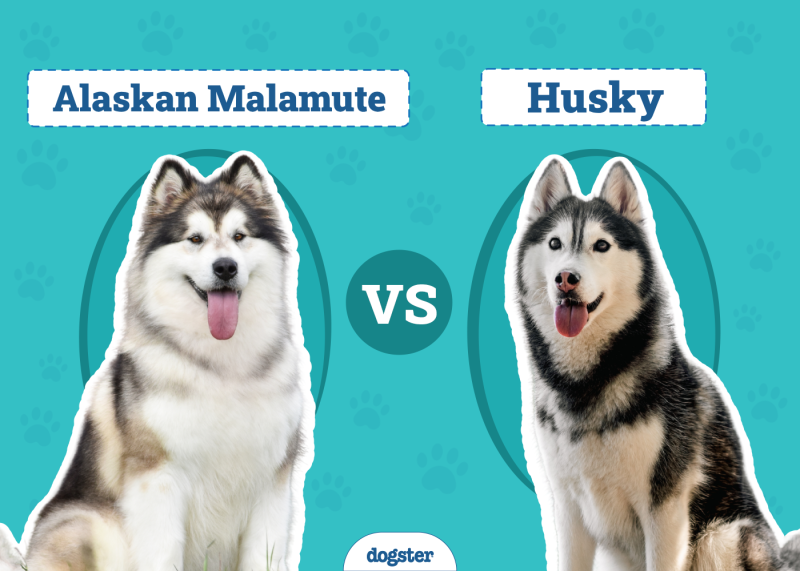Drug ingestion by dogs is nothing new. Whether they are legal, prescribed medications that members of the household are on or illegal street drugs, dogs are curious by nature and will readily consume anything that drops on the floor. In some cases, dogs may exhibit completely different clinical signs than if humans had consumed the same substance. Many times, a single dose may prove to be deadly. In instances where a dog consumes methamphetamine, this may be the case. In this article, we’ll explore what happens when dogs consume meth and what to do if it happens.
If you need veterinary advice for your pet, we recommend PangoVet’s TeleVet service. You can have a video consultation with a real veterinarian from the comfort of wherever you are, no travel needed. PangoVet’s vets can provide you with personalized care and advice, and hopefully help ease your mind.

If you want to speak with a vet online, head to PangoVet and get the personalized advice you need for your pet — all at an affordable price!
Please note that PangoVet does not offer prescriptions and is not for medical emergencies.

What Is Methamphetamine?
Methamphetamine is a part of the class of drugs called amphetamines. This may sound familiar to you as there are many legal forms of amphetamines in both prescription and over-the-counter human products. For example, dextromethorphan is in many OTC medications as a cough suppressant. It is safe when humans take it at prescribed doses but can be severely toxic if your dog ingests it.
Methamphetamine and other types of amphetamines are stimulants for the central nervous system. Frequently referred to as “uppers,” these drugs will cause increased heart rates, elevated blood pressure, and an overall feeling of being unstoppable. Unfortunately, when consumed, meth stays in the central nervous system for quite a while, the drug remaining fairly unchanged. In other words, the body does not metabolize it quickly. Therefore, the stimulant effects can be prolonged, making long-term aggressive care imperative.

Signs Your Dog May Have Ingested Meth
The first signs of toxicosis are severe agitation and anxiety. Your dog may be barking non-stop, running around, and panicking as if they are on a caffeine high. Nothing can calm them down. This can then progress to tremors, seizures, a severely elevated heart rate, hypertension, and hyperthermia. You may notice that your dog’s pupils are dilated, they are breathing quickly and heavily, and their gums are an abnormal color: typically red (what we refer to as injected) or pale due to poor circulation.
These signs can occur from other medications, which is why you must tell the veterinarian about all possible drug exposures. Human blood pressure medications, ADHD meds, cocaine, and cough/cold medications can all mimic methamphetamine toxicosis.
Unfortunately, many owners do not come clean when they bring their dogs to the vet hospital after they have consumed drugs. As veterinarians, our immediate reaction is not to call the cops and have you arrested for illegal drug possession. Our first concern is figuring out what your dog ate so that they can best be treated. If you know without a shadow of a doubt that there is meth in the house, or your dog has been around anyone that has a history of meth use, tell your veterinarian. If you were walking your dog and they ingested an unknown substance off the ground, that’s trickier. But we beg of you, don’t lie; we are just trying to help your dog.
Is There a Test for Methamphetamine Toxicity?
The easiest and fastest way that we can test for methamphetamine ingestion is to use over-the-counter drug tests for people. These utilize a urine sample, and the results can be obtained in a few minutes. Some veterinary clinics don’t carry these kits, or if they have them, they may be expired since they don’t get used that often. If you suspect or know your dog ingested drugs, we recommend going by the pharmacy and buying this kit on your way to the veterinarian. While these tests are not 100%, they are the quickest, best way we have to screen your dog.
Remember that a blood or urine sample can be obtained at human hospitals and often immediately taken to their in-house laboratory. Some hospitals have staff within the lab 24/7, making testing much more efficient. We don’t have this luxury in veterinary medicine. Although some university clinics have on-site laboratories, they are not available for a wide range of services like human hospitals.

How Will My Dog Be Treated?
There is absolutely no at-home treatment that you can use on your dog. You may be tempted to try and make your dog vomit in an attempt to decontaminate them. But if your dog is already showing abnormal signs, the drug has already been absorbed and is in circulation. Not to mention that inducing vomiting when your dog may not be neurologically appropriate is dangerous and can put them at risk for aspiration pneumonia.
Your dog will need to be hospitalized and supported with IV fluids, cardiac medications to help bring down their heart rate, blood pressure medications to control their blood pressure, and potent sedatives. These medications must be given as injections and sometimes constant rate infusions (CRIs) to manage your dog’s signs. While they are receiving the medications, your dog will need to be closely monitored so that the treatments can be adjusted.
Because such aggressive care is needed, your dog must be seen at a 24-hour specialty or university veterinary hospital. Your local veterinarian will likely not have the appropriate medications, tools, or staff to handle a case like this. Do not get upset when they send you to a different hospital; they only want what’s best for your dog.

Will My Dog Survive?
This is a big unknown. Again, your dog needs to be seen by a large specialty hospital as soon as possible and treated aggressively to have the best chance of survival. Even then, your dog may have ingested so much that they cannot be saved. Often, we don’t know how much of a toxic dose was ingested. Emergency veterinarians can treat your dog supportively while they metabolize the drug. Unfortunately, many dogs that ingest meth will die.

Conclusion
Methamphetamine, or meth, is a well-known illicit drug. Although other amphetamines are in human medications, they are toxic in all forms for your dog. If ingested, meth will cause nervous system stimulation. Your dog will be highly agitated, barking and panting, have an elevated heart rate and blood pressure, and can progress to having seizures and even dying. There are absolutely no at-home treatments for meth consumption. Your dog must go to the nearest 24/7 emergency clinic or veterinary university for treatment. Even with aggressive treatment, your dog may pass away. If your dog ingests meth, be upfront and honest with the veterinarian so that an accurate diagnosis and treatment are not delayed.
Featured Image Credit: Kaesler Media, Shutterstock























2 Responses
my friend is a meth addict and her blonde Chihuahua frequently ingests meth. It is the most terrible thing I've ever seen in my life. She locks the dog in a bathroom while it spins constantly, for numerous hours, until his legs fail and the meth has worn off some. My friend gives the dog liquid Benadryl, which does no good, and just makes the dog flush and dehydrated more. I'm temporarily living in her house with two other meth addicts. They all swear they are not dropping any meth. This lady previously had another blonde Chihuahua, and it would find an ingest meth also. She let someone else have that dog and they moved and left the dog to starve to death. Idk what to do because I'm currently living in this ladies house.
Hello Diana,
thank you for your question. We understand how difficult the situation must be for you, especially when you are currently dependent on the lady. However, in this situation, our suggestion would be to move away from this house as soon as possible. From what you described, the house doesn't sound like the best environment to live in.
After you move out, you can alert the authorities about what is going on in the house and they should be able to handle the situation. Until you will manage to move out, you can try to keep the dog safe by making sure they won't get in the contact with the meth.
This is very serious situation since the dog is in the fatal danger so don't hesitate. Best of luck!